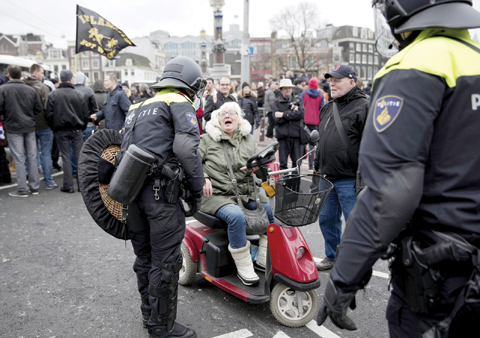MALE: President Mohamed Muizzu of the Maldives vowed Friday to expel Indian troops deployed in the strategically located archipelago, in his first speech to the nation after being sworn into power. Muizzu, 45, did not name India — but promised he would deliver on his election promises, key among them a pledge to evict some 50 to 75 Indian security personnel.
“The country will not have any foreign military personnel in the Maldives,” Muizzu said after being sworn in before chief justice Ahmed Adnan at a televised, open-air ceremony. “When it comes to our security, I will draw a red line. The Maldives will respect the red lines of other countries too.”
Earlier this week, Muizzu told AFP that his intention was not to upend the regional balance by replacing the Indian military with Chinese troops. Muizzu, a former mayor of the capital Male and a construction minister for seven years, had previously promised to cultivate “strong ties” with China, a key financial backer of his nation.
The country’s eighth president since independence from Britain in 1965, Muizzu was elected in September as a proxy for a pro-China predecessor who is jailed on corruption charges. High-level representatives from both China and India were in attendance, as well as from Bangladesh, the Seychelles and Sri Lanka.
Primarily known as one of the most expensive holiday destinations in South Asia, with pristine white beaches and secluded resorts, the Maldives has also become a geopolitical hotspot. Global east-west shipping lanes pass the nation’s chain of 1,192 tiny coral islands, stretching around 800 kilometers (500 miles) across the equator.
China was represented at the ceremony by State Councillor Shen Yiqin as a special envoy of President Xi Jinping, who visited the Maldives in 2014 when Muizzu’s mentor Abdulla Yameen was president. Maldivian media had reported for days that India’s President Droupadi Murmu was expected to attend, but New Delhi announced sending Minister of Earth Sciences Kiren Rijiju instead.
‘Too small to be entangled’
“Maldives is too small to be entangled in geopolitical rivalry,” Muizzu said in his interview with AFP. “I am not very much interested to engage the Maldivian foreign policy in this.” He told the Chinese Communist Party a year ago that he wanted stronger ties with Beijing should his Progressive Party win the 2023 elections.
“We look forward to returning to government in 2023, with President Yameen at the helm, to script a further chapter of strong ties between our two countries, both domestically and internationally,” Muizzu said at the time. Yameen was barred from running in this year’s election because of a criminal conviction and an 11-year jail term for corruption. He nominated Muizzu as his proxy.
Muizzu, a British-educated civil engineer, has attempted to walk a balance between regional rivals India and China. “We are going to work together with all the countries, India, China and all other countries as well,” he told AFP. Muizzu said he hoped to begin negotiations with New Delhi on the withdrawal of Indian personnel deployed to operate three aircraft gifted to the Maldives.
India has traditionally considered the Maldives, a country with a population of about 380,000 Sunni Muslims, to be within its sphere of influence. But during the presidency of Yameen, who borrowed heavily from China for construction projects, New Delhi worried about Beijing’s expanding footprint.
India has a history of entanglements in the Maldives, including the deployment of soldiers to thwart a 1988 coup attempt. But Muizzu also faces an even greater challenge: his nation is one of the countries most threatened by rising sea levels linked to climate change. Eighty percent of the Maldives is less than a meter (three feet) above sea level. – AFP











